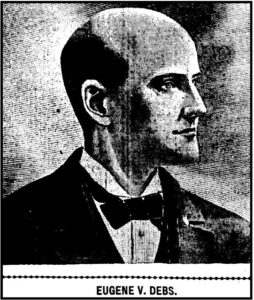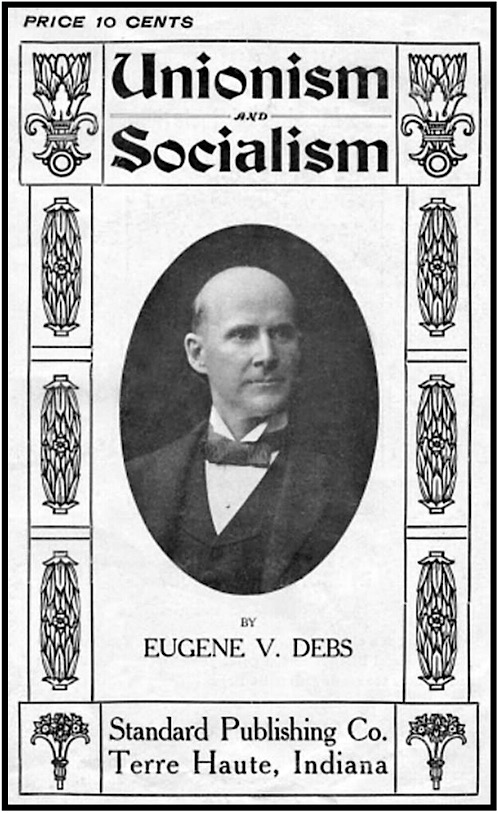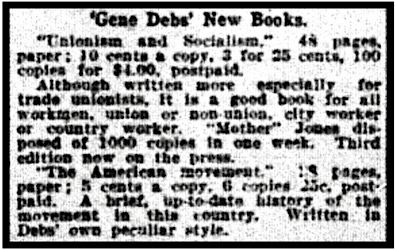 —————
—————
Hellraisers Journal – Sunday February 22, 1903
Rochester, New York – Eugene Debs Speaks on Socialism and the Labor Movement
Rochester Democrat and Chronicle (New York) of February 9, 1903:
SOME PHASES OF LABOR MOVEMENT
———-ADDRESS OF EUGENE V. DEBS AT FITZHUGH HALL.
———-THE WORKINGMAN’S HOPE
———-
Socialistic Programme Set Forth as
the Need of the People-The Tool of Production
-Reflections on Trusts-Panic Prophesied.
———-
Eugene V. Debs, of Denver, Col., the prominent labor leader and Socialist, spoke at Fitzhugh Hall yesterday afternoon, under the auspices of the Labor Lyceum. His subject was “Some Phases of the Labor Movement; or, Socialism and Civilization.” Mr. Debs was given an enthusiastic reception, and for two hours he had the close attention of the audience. The seats on the floor of the hall were filled and but few were empty in the gallery.
Phillip Jackson presided at the meeting and made a few remarks, after which he introduced Mr. Debs. In his eloquent address, Mr. Debs said, in part:
The labor question broadly stated is the question of all humanity and upon its just solution depend the peace of society and the survival of civilization. The central and controlling fact of civilization is the evolution of industry.
A little over a century and a quarter ago, the American colonists were compelled to declare their political independence. The people were then engaged largely in agricultural pursuits, what they manufactured was produced in simple and primitive ways and they used with their hands the tools with which they did their work. The problem of making a living was a comparatively easy one. Each man could with the product of his own labor satisfy his own wants.
Long ago the too simple tool of those days was touched by the magic want of invention, until its mechanism has now become marvelously complex. In the great modern industrial evolution, the workingman has suffered, and because of his ignorance has allowed the tool of production to pass from his grasp. The cunning that was in the hand of labor has passed into the machine. As competition has become keen, handicraft has been succeeded more and more by the machine work, until skilled labor has become common labor; the struggle for existence became so hard that woman was forced into the labor market and become a factor in industrial conditions.
As the evolution of machinery has continually progressed, it has been found that many of these could be operated by the deft touch of children, until now 3 million of these have been forced into the labor market in competition with men and women. This has resulted from the system that makes profit the all-important consideration and life of little importance. There must be cheap labor in spite of its effects on the lives of human beings.
The state of Alabama once had a law against child labor. The time is coming, however, when competition will force manufacturers to operate their factories where the raw materials are produced. This has already been done by the New England manufacturers. They went to the lawmakers of Alabama and said: “We must have cheap labor if we are to compete in the markets of the world, and in order to do this, we must employ the children in our mills. You have a law against the employment of children in this state. We should like it to come here, but, if this is enforced, it will compel us to go elsewhere.” What was the result? Today there is no law against the employment of children in Alabama.
We have seen how, under the prevailing system, the fortunes of the few mount to fabulous heights, while the great mass of the people are doomed to an existence of want, misery, and woe. There are some misguided persons who imagine that if the Democratic Party were in power, it would effect the decentralization of capital and bring back the former days of competition. If it were possible in some mysterious way to do this, it would be quite ineffective. With the development in modern machinery, capital would have combined again in within 20 years, and would be stronger than it has ever been in the past or is in the present.
The question is, shall this combination of capital crush us, or shall we take our place in line with this modern order of things and make it conform to our uses? We can’t destroy the trust, the great combinations of capital, no more than we can go back to the days of the hand tool, the stagecoach, the canal barge, or the tallow candle.
This modern tool is a vast complex machine that needs an army of workingmen to operate it. If it belongs to one man, all the profits will accrue to one man. That man we call a capitalist. It takes 100,000 men to produce the steel manufactured in this country. This complex tool belongs to Andrew Carnegie, who, himself, if his life depended on it, could not produce enough steel to make a cambric needle, no more than John D. Rockefeller could produce oil to grease a gimlet. Despite these facts, to these men go the profits resulting from the labor of thousands of workingmen.
The workingman cannot get rich under the present system. It is only the man who exploits the labor of others who gets rich. In the old days the only way a man could get rich was by owning the man. If the 4 million slaves who were emancipated 40 years ago were offered to the capitalists of today, they would not take them under any consideration. It is not necessary today that you should own slaves in order to become rich; it is only necessary that you should control the tools of production. It does not make any difference what other changes take place, so long as the tools of production are owned and controlled by individuals, the laboring man will be dependent, the slave of industrial conditions.
Society is being divided into two classes. There are those in our country today who do not like to hear anything said about classes. They say there is no such thing as classes in the United States. Among these is Chauncey Depew. He tells us that in the great American republic every boy and young man has a chance of someday becoming President. Let me tell you that there are many of these same boys and young men who would at times willingly swap their chances of becoming President of the United States for a ham sandwich.
I stand in your presence this afternoon a socialist. I believe this earth is the inheritance of every human being who inhabits it. We have, however, today the capitalist class that owns the tools of production. They don’t work with these tools themselves, but they buy the labor they need in the open market. While they don’t use these tools, they lay claim to all the wealth produced by them, and those who use the tools can only live by selling their labor to those who own the tools.
We are in the midst of a great class struggle, a conflict which is shaking the foundations of society. Those who have read history carefully know that the great struggles of the world have been class struggles. In the impending revolution, the laboring class can only emancipate itself by bringing about the common ownership of the tools of production, then all humanity will be emancipated, even to J. Pierpont Morgan.
The only real reason for war today is that the capitalists may find foreign markets for their products. When it is decided by these that war is needed to open up a foreign market for the goods that those at home cannot buy, they induce the newspapers to serve to the people a diet of what is termed “patriotism,” and through this, for some unaccountable reason, an insatiable desire to kill is produced in the minds of the people.
To me war is a horrible thing. I think it is the prostitution of genius to glorify it.
In proportion to the value of what he produces, the American laboring man is paid less than his Japanese or Chinese competitor.
The purpose of socialism is not to reform. Its platform calls for a revolution now in present conditions.
We socialists don’t want socialism now. The time is not ripe for it. We would not have it in Rochester tomorrow if we could. But the time for the ushering in of socialism is ripening very rapidly. What is needed to make the laboring people of the country ready for it is a well-developed panic. I am not desirous of posing as a prophet of evil, but this time is coming. Neither Republican nor the Democratic Party will guarantee that this period of false prosperity will last. A panic is coming, and the next panic will not be confined to America. It will be international in its effect, and then will be the time for the introduction of the coming order of things.
[Photograph and emphasis added.]
~~~~~~~~~~~~~~~~~~~~~~~~~
SOURCES
Quote EVD, Socialist Ripe Trade Unionist, WLUC p45, May 31, 1902
https://archive.org/details/02OfficialReport5thConvALU/page/n44/mode/2up
Democrat and Chronicle
(Rochester, New York)
-Feb 9, 1903
https://www.newspapers.com/image/135311596/
https://www.marxists.org/archive/debs/works/1903/030208-debs-socialismandcivilization.pdf
IMAGE
EVD, LW p1, Aug 30, 1902
https://chroniclingamerica.loc.gov/lccn/sn78000395/1902-08-30/ed-1/seq-1/
See also:
Unionism and Socialism, A Plea for Both
-by Eugene V. Debs
Standard Publishing Company
Terre Haute, Indiana, 1904
https://babel.hathitrust.org/cgi/pt?id=uc1.$b240054&view=2up&seq=2
https://archive.org/details/04DebsUnionismandsocialism/mode/2up
Aug 13, 1904, Appeal to Reason, page 3
Ad for Unionism and Socialism, Mother Jones is selling copies.
https://www.newspapers.com/image/66990985/
https://www.marxists.org/history/usa/pubs/appeal-to-reason/040813-appealtoreason-w454.pdf
Tag: Unionism and Socialism
https://weneverforget.org/tag/unionism-and-socialism/
~~~~~~~~~~~~~~~~~~~~~~~~~
Be Moderate, We Only Want the Earth
-James Connolly Songs Of Freedom Band



